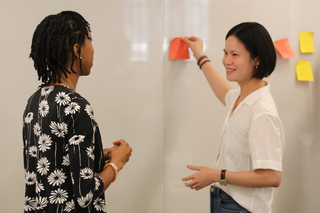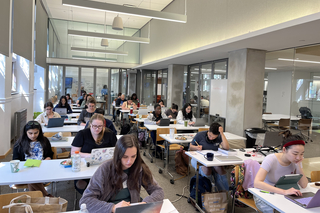The GWL supports more than academic writing. We help graduate students extend the impact of their research by bringing it to audiences beyond academia. Whether you want to impact public policy, tell compelling stories, or keep the public informed about important developments in your field, the GWL offers resources to help you reach your target audience. We offer workshops on policy memos, magazine writing, opinion-editorials, academic blogging, podcasting, and more. To help you explore the conventions of the genre you’re writing in, this page offers guidance and links to model texts written by our workshop teachers and participants.
Get Feedback on Your Writing Project
Schedule a 1–on-1 consultation to plan or get feedback while you’re writing about research for a public audience.
Opinion Editorials
If you want to leverage your expertise to advocate for some action, consider writing an opinion editorial. Op-eds weave together information and argument to teach the reader something new and influence policy and culture.
- Pitch a topic that is at the intersection of: 1) your lived experience 2) what is timely in the news cycle and 3) your scholarly expertise. Write the opinion piece that you specifically are well-positioned to write.
- Read other op-eds that are published in your target publication(s). How long are they? What is the tone they strike? Chatty and informal (New York Magazine’s The Cut), serious and academic (London Review of Books), provocative and polemical (Jacobin, The Baffler)?
- Communicate clearly, avoiding jargon that is specific to your field. Get a reader from outside your area of expertise, like a friend or family member, and ask them what seems clear and what doesn’t.
The op-eds linked below were written by Yale graduate students who attended our annual workshop on op-ed writing:
-
Bill Gates is disengaging from US climate advocacy when it’s needed most
The Hill (2025)
Isabela Valencia
-
Why Science Funding Matters in Iowa
Telegraph Herald (2025)
Collin Link
-
Yes, there’s still reason to be worried about a national abortion ban. Here's why.
SF Chronicle (2022)
Adora Svitak & Rene Almeling
-
There’s an industry that talks daily about ‘masters’ and ‘slaves.’ It needs to stop.
The Washington Post (2020)
Sinclaire Im
Science Reporting
Many newspapers and magazines have a science & technology section which publishes reports of recent breakthroughs or profiles of individual scientists aimed at a general audience. In spring of 2025, the Graduate Writing Lab hosted New York Times writer Carl Zimmer to teach a two-part workshop series on science reporting, and his key takeaways included:
- Tell a story in your piece: make sure there is a compelling opener, a logical thread throughout, and a satisfying conclusion.
- Include tactile details that can help the reader relate to the people and settings you introduce.
- Avoid jargon at all costs! Your goal is not to teach terminology, but to convey ideas.
The articles linked below, written by Caleb Gordon and Reem Abu-Shamma, are two profile pieces that came out of that spring 2025 workshop series:
-
Hybrid brains and the search for what makes us human
The Node (2025)
Caleb Gordon
-
How Reptiles Took Over Land and Sea
The Node (2025)
Reem Abu-Shamma
Podcasts
Podcasting can be a powerful way to share academic topics with audiences who want to fit their learning into a busy schedule. Podcasts are also versatile—they can be bite-sized overviews or multi-part deep-dives, one consistent host interviewing experts or multiple co-hosts engaging in a discussion, formal or casual. Let your decisions about topics and format be guided by your target audience:
- Are you trying to reach other experts in your field? More general listeners? Some specific sub-group?
- What topics do they already care about? What do they already know about the topics you want to discuss?
- How much time will they have to listen? What can you do to make your content most engaging for them?
Linked below are three podcasts hosted or co-hosted by Graduate Writing Lab Fellows:
-
Yale Journal of Biology and Medicine
Collaboratively written and recorded by graduate and professional school students through the Yale Journal of Biology and Medicine.
-
Riel Opera Talk
Written and recorded by Taryn Dubois (née Jackson) and Sarah Koval while at the University of Toronto in 2017. Taryn Dubois is now a PhD candidate in music history at Yale.
-
Ritual
Created and hosted by History of Art PhD student Savannah Marquardt in 2017.
Explore GWL Programs
-
Writing Consultations
Get 1-on-1 feedback at any stage of the writing process—from brainstorming to final edits.
-
Workshops & Panels
Interactive opportunities to grow your academic writing knowledge or expand your toolkit of skills.
-
Peer-Review Groups
Groups of 4–7 students who meet weekly to share feedback, make progress, and support one another on a common project.
-
Writing Retreats & All Writes
Full-day and half-day events where graduate students set goals and write as a community in a quiet, supportive space.
-
Audience
-
Category


